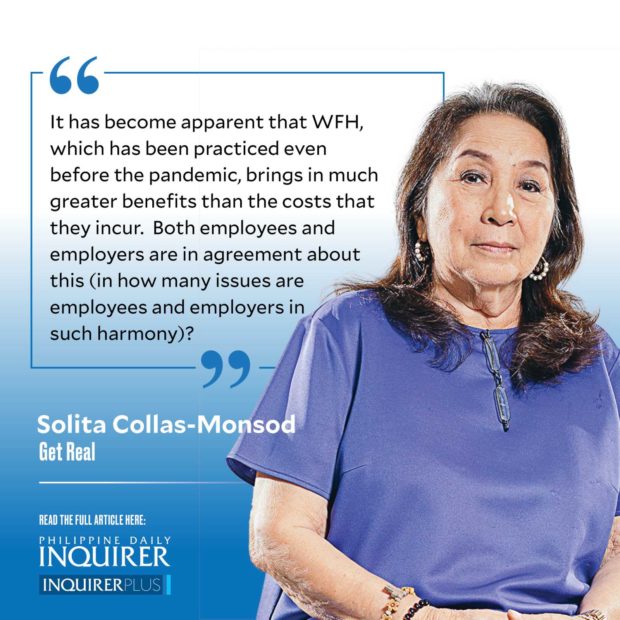
Well, I do consider. And I think that the WFH issue is much larger than the BPO workers. Furthermore, I think that the FIRB decision, and Neda’s recent support of it is, to say the least, ill-advised as well as substantively baseless.
Here’s what the FIRB chair was quoted as saying: “The WFH arrangement is only a time-bound temporary measure adopted during the surge of the COVID-19 pandemic. Given the increasing vaccination rate of Filipinos nationwide, we can now undertake safe measures for physical reporting of employees, including those working in the IT-BPM firms operating within ecozones and freeports. … The employees’ return to the office would provide more opportunities and pave the way for the recovery of local micro, small, and medium enterprises (MSMEs) that depend on IT-BPM employees for their livelihood.”
Good grief. It is as if Secretary Carlos Dominguez III has been caught in a time warp and is blissfully unaware of any and all developments that have arisen since WFH arrangements were adopted. What are we talking about here? For one, WFH arrangements are now considered part of the new normal, and governments, specifically in India (which is the biggest competitor of our local BPOs), are already working to provide a legal framework for WFH and other arrangements that have become common since the pandemic.
And why are they doing this? Well, it has become apparent that WFH, which has been practiced even before the pandemic, brings in much greater benefits than the costs that they incur. Both employees and employers are in agreement about this (in how many issues are employees and employers in such harmony)?
From the employee’s perspective, the pros of working from home, as listed by Investopedia, are no commute, more time available to sleep and rest, money saved by not commuting (which is of particular relevance now) or buying lunch when at the office, greater flexibility, more independence, and no office distractions. The cons of working from home are isolation and loneliness, lack of motivation, at-home distractions, and unmonitored performance.
From the employer’s perspective, “the pros of having employees work from home include increased employee satisfaction, which leads to higher employee retention, the ability to hire from a larger pool of talent as opposed to the physical location of the office, increased employee productivity, and lower costs, in regards to rent, operations, and equipment. Some of the cons for employers include lack of team building, lack of team innovation, challenges with communication, and the inability to gauge performance in person.”
What about from the larger community’s perspective? Think of it, Reader. What do you think some of the most pressing problems have been (before the pandemic)? Were they not the traffic congestion and the resulting loss in productivity? The crowded MRTs and LRTs that made the commuter’s life a living hell? Working from home (if adopted as a government policy) would in no small way help to assuage the situation.
And think not only of traffic congestion but of urban congestion. WFH arrangements would allow people to live much farther away from their place of work, reduce the demand for, and, ceteris paribus, the costs of urban living, and spread growth and development more evenly across space. Example: a BPO worker in Subic (or even Cebu), working for a BPO company in Makati.
Of course, not all occupations would allow for WFH, like workers in an assembly line. But to the extent that this government insists on looking at WFH as nothing more than a temporary measure instead of as part of a new normal that may bring in more benefits than costs, not to mention the positive externalities, we are doomed to remaining mediocre.
————–
solita_monsod@yahoo.com

